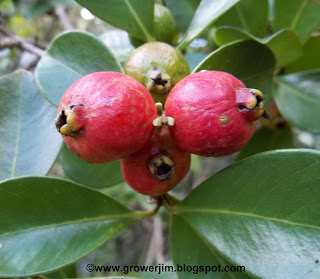Neomea 'Ralph Davis' is an interesting intergeneric hybrid between Neoregelia and Aechmea. The foliage develops a slight reddish tint in the center of the plant as blooming time approaches. The cream and rose-colored inflorescence contrasts with the foliage nicely. The actual flowers are small, even by Neoregelia standards, and are nearly inconspicuous.
The leaf texture is thick and stiff, while the inflorescence keeps good color for at least six weeks. Plants grow about two feet across.
Bright morning light or filtered light throughout the day helps keep good color in the foliage. The plants tolerate brief periods of freezing temperatures as long as no frost actually settles on the leaves.
Wednesday, August 31, 2011
Friday, August 5, 2011
Friday Creature Feature - Opossum
This month's creature is a mostly nocturnal animal and the only marsupial in North America, the opossum. Although they are seldom seen and rarely heard, opossums are intelligent creatures that help control the population of vermin around homes. They eat just about anything, including insects, fruit, mice, rats and carrion. They are nomadic and go wherever the food is. Learning and discrimination tests indicate they are smarter than dogs. Opossums are clean animals that bathe and groom themselves as meticulously as any cat.
As a species, they are survivors. Fossil remains of these creatures have been found from 70 million years ago. They have a high level of immunity to most diseases and are more resistant to rabies than virtually any other mammal.
The gestation period of an opossum is only 13 days and the young are the size of a honeybee when born. Litters of 5 to 8 are produced up to twice a year and they remain in the mother's pouch for about three months. Although they sometimes live in trees, they prefer nesting in underground dens. They do not dig their own burrows, but use those abandoned by other animals.
When cornered, opossums may hiss and bare their teeth, but if there is no avenue of escape, they fall over and play dead. They remain in this state until the danger has passed.
Now, don't you play 'possum! Join the fun below!
As a species, they are survivors. Fossil remains of these creatures have been found from 70 million years ago. They have a high level of immunity to most diseases and are more resistant to rabies than virtually any other mammal.
The gestation period of an opossum is only 13 days and the young are the size of a honeybee when born. Litters of 5 to 8 are produced up to twice a year and they remain in the mother's pouch for about three months. Although they sometimes live in trees, they prefer nesting in underground dens. They do not dig their own burrows, but use those abandoned by other animals.
When cornered, opossums may hiss and bare their teeth, but if there is no avenue of escape, they fall over and play dead. They remain in this state until the danger has passed.
Now, don't you play 'possum! Join the fun below!
 |
| Y'all come back now! |
The First Friday Creature Feature is hosted right here on the first Friday of every month. You're invited to join in! Here's how:
1. Write a post featuring some creature that lives in your garden.
2. Within your post, include a link to my Creature Feature post so your readers will know where to find the creatures.
3. Add your link below and leave a comment.
Thanks for participating and please join in again next month!
Monday, August 1, 2011
Harvest Monday - August 2011
Our temperatures have been running a few degrees above normal all summer and the rainfall has been below normal. Some crops have failed completely but others are still hanging in there.
Here's what's on the table this week:
Cherry tomatoes have been producing well all summer, even with the heat. I'm growing them in 10-inch pots that are under irrigation out in the nursery.
The elderberries are putting out less fruit now, but there's still enough for a small batch of jam.
The white sapote season is almost over. Just a few clusters of fruit remain on the tree.
There are plenty of strawberry guavas ready to pick every day.
Here's what's on the table this week:
Cherry tomatoes have been producing well all summer, even with the heat. I'm growing them in 10-inch pots that are under irrigation out in the nursery.
The elderberries are putting out less fruit now, but there's still enough for a small batch of jam.
The white sapote season is almost over. Just a few clusters of fruit remain on the tree.
There are plenty of strawberry guavas ready to pick every day.
Persian limes are another daily harvest...
along with the smaller, but plentiful, key limes.
The starfruit harvest seems to have started a little earlier this year. I will be picking these from now until spring (or a hard freeze).
This is the first year I've had a crop from Syzygium smithii (lilly pilly). I'll be profiling this plant soon.
I unthinkingly ate all of the ripe figs before I made my rounds with the camera, so no photos of those today. Who could resist?
To see what other gardeners are enjoying today, visit Daphne's Dandelions, host blog of the Harvest Monday meme.
Subscribe to:
Comments (Atom)












